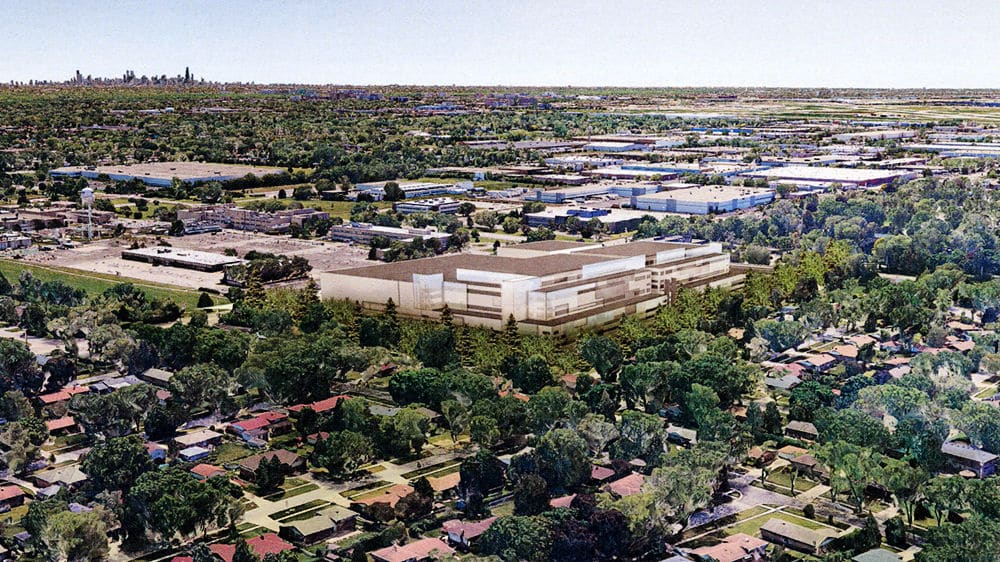Vetter’s $163 Million Expansion In Des Plaines
Vetter, a German pharmaceutical company specializing in the filling and packaging of injectable medications, has unveiled plans for a substantial $163 million expansion of its U.S. headquarters in Des Plaines, Illinois. This ambitious project includes the construction of a 158,000-square-foot manufacturing and office facility on the company’s nearly 18-acre campus at 10 West Algonquin Road. The expansion aims to consolidate operations from Vetter‘s Skokie site and is projected to create at least 50 full-time jobs in Des Plaines within four years.

Impact on Commercial Real Estate in Des Plaines
The introduction of such a significant development is poised to have a multifaceted impact on the commercial real estate landscape in Des Plaines:
Increased Demand for Commercial Properties: Vetter’s expansion signals a robust commitment to Des Plaines, potentially attracting ancillary businesses such as suppliers, logistics companies, and service providers. This influx can lead to heightened demand for commercial properties, including office spaces, warehouses, and retail outlets, thereby invigorating the local real estate market.
Enhanced Property Values: The development of a state-of-the-art facility can serve as a catalyst for appreciating property values in the vicinity. As the area becomes more desirable for businesses, the value of surrounding commercial real estate is likely to experience an uptick.
Revitalization of Underutilized Areas: Vetter’s decision to expand on previously undeveloped land demonstrates the potential for transforming underutilized spaces into productive assets. This move may inspire other developers to consider similar projects, leading to broader urban renewal and increased utilization of available land.
Job Creation and Economic Growth: The addition of at least 50 full-time positions not only boosts employment but also increases the spending power within the community. This economic stimulation can further drive demand for commercial spaces, as new businesses emerge to cater to the growing workforce.
Tax Incentives and Their Role
To facilitate this expansion, Vetter sought support for a Cook County property tax incentive designed to encourage industrial redevelopment. The Des Plaines City Council recommended approval of this incentive, which would apply solely to the new building and is estimated to reduce Vetter’s annual tax bill by approximately $3.7 million over a 12-year period.
Such tax incentives are instrumental in making large-scale projects financially viable. By alleviating some of the tax burdens, they enable companies like Vetter to allocate more resources toward development and operations, thereby accelerating project timelines and enhancing the overall feasibility.
Community and Political Perspectives
While the expansion has garnered substantial support, it has not been without its detractors. 5th Ward Alderman Carla Brookman opposed both the development and the accompanying tax abatement. She expressed concerns that the city missed an opportunity to acquire the land for public use and questioned the suitability of a manufacturing facility in that location. Additionally, Brookman raised issues regarding potential noise impacts on nearby residential areas.
In response, other city officials highlighted measures to mitigate such concerns, including plans to construct fencing as a buffer to minimize noise disturbances. This dialogue underscores the importance of balancing economic development with community interests and environmental considerations.
Broader Implications for Des Plaines
Vetter’s expansion is emblematic of a broader trend where municipalities leverage tax incentives to attract and retain businesses. For Des Plaines, this development could set a precedent, showcasing the city’s willingness to collaborate with enterprises and offer favorable conditions for growth.
Furthermore, the project aligns with regional efforts to bolster the pharmaceutical and biotech sectors, positioning Des Plaines as a hub for such industries. This strategic alignment can enhance the city’s reputation, making it more appealing to similar companies seeking expansion opportunities.
Conclusion
Vetter’s $163 million expansion in Des Plaines represents a significant milestone for the city’s commercial real estate sector. The anticipated increase in demand for commercial properties, coupled with potential appreciation in property values and economic revitalization, underscores the transformative impact of this development. While challenges and community concerns must be addressed, the overall trajectory suggests a positive outlook for Des Plaines as it embraces growth and positions itself as a key player in the pharmaceutical manufacturing landscape.
If you would like to learn more about large land sites, feel free to contact our commercial real estate agents in Des Plaines.

